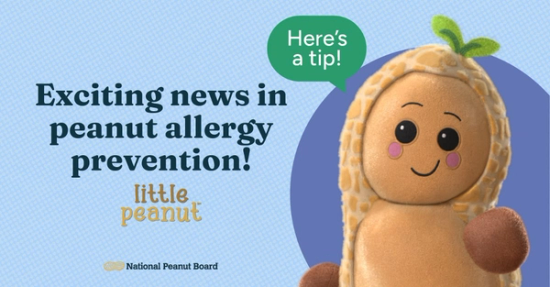By Christina Billos Chandlee
Since launching Little Peanut in 2024, the National Peanut Board has transformed a seemingly simple plushie into a comprehensive platform reshaping how families approach early peanut introduction. What began as a fun way to engage parents with raising adventurous eaters now serves as the cornerstone of NPB's peanut allergy prevention strategy, driving critical conversations between parents and healthcare providers.
Turning Questions into Confidence
New parents often have overwhelming questions about feeding recommendations, especially when introducing foods that could potentially cause allergic reactions during the narrow window for early introduction that can prevent peanut allergies. That’s where Little Peanut helps. Research shows early peanut introduction can reduce allergy risk by up to 86 percent, making timing essential. Little Peanut bridges the gap between medical guidance and parent confidence through approachable, evidence-based resources that remove intimidating medical jargon.
Little Peanut’s growing digital presence offers clear, actionable guidance that fits naturally into everyday routines. Families receive friendly advice, such as celebrating a baby’s first taste of peanut butter mixed with breast milk, while gaining peace of mind from understanding allergy prevention.
Connecting with Families Through New Platforms and Partnerships
To date, more than 1,000 Little Peanut plushies have been distributed nationwide, including over 600 to healthcare providers and WIC counselors. In year one, 55 providers proactively requested plushies after engaging with campaign content across paid, owned, earned and social media channels. These targeted efforts helped establish Little Peanut as a trusted tool for sparking meaningful conversations with families at critical touchpoints, especially during the 4-month well baby visit.
Little Peanut now stars in animated videos that turn health education into engaging storytelling. The character’s interactive website at LittlePeanut.Tips provides practical tools, including the “5 Easy Ways to Introduce Peanuts” card and playful coloring pages.
The real impact happens when Little Peanut meets families where they are. Through partnerships with WIC programs, peanut allergy prevention resources now reach households that might otherwise miss this life-changing opportunity. Pediatric offices across the country also rely on Little Peanut to transform potentially stressful conversations into positive, collaborative discussions. Healthcare providers appreciate how NPB’s approachable, evidence-based materials guide families with confidence.
Key metrics from 2024—particularly around reach and awareness—helped drive early adoption and lay the groundwork for deeper engagement in 2025. Additional adoption data will be available following the Pulse campaign rollout and follow-up with recent recipients.
Future Growth
As Little Peanut’s platform evolves, the focus remains on authentic connections and meaningful impact. The character will continue appearing at industry events, providing opportunities to share resources that support early peanut introduction. NPB is also exploring ways for families to engage with Little Peanut beyond digital platforms, creating tools that help parents discuss early introduction with confidence at home.
From conference halls to kitchen tables, NPB continues helping families introduce peanut foods safely so peanuts can become a regular part of a baby’s diet. Eat early. Eat often.
Building Lasting Impact
Little Peanut is more than marketing—it is a public health movement. Every empowered family, equipped provider, and sparked conversation advances peanut allergy prevention as a standard part of infant nutrition. The message remains simple yet powerful: Eat early. Eat often. Little Peanut is turning evidence-based prevention into shared success stories and helping reduce peanut allergy rates across the country.
